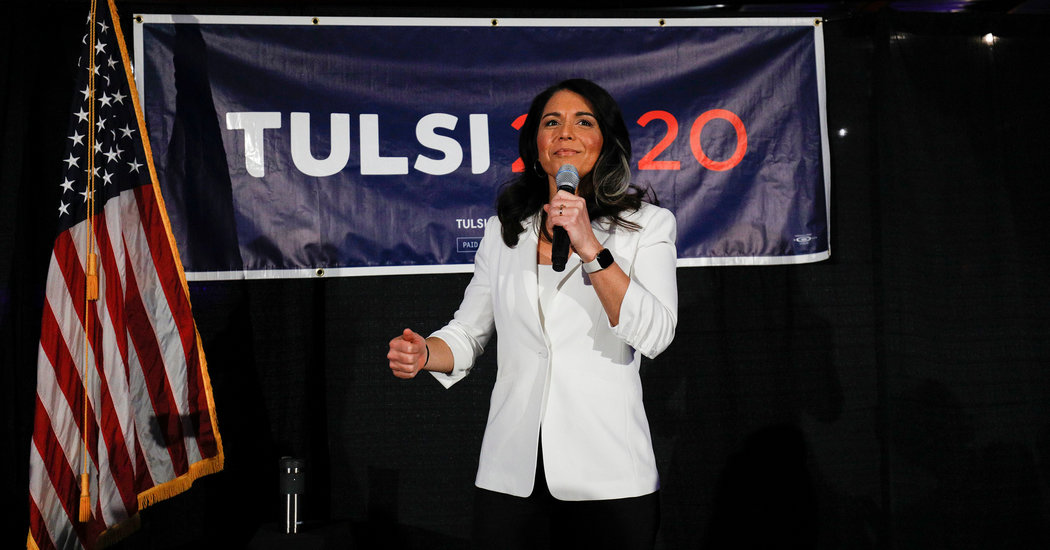Representative Tulsi Gabbard of Hawaii, who ran a foreign policy-focused campaign for the presidential nomination of a party she sharply criticized, announced on Thursday that she was dropping out of the race.
Ms. Gabbard, who had been one of only three candidates remaining in the Democratic primary, said she would throw her support to former Vice President Joseph R. Biden Jr., who has accumulated a nearly insurmountable lead in the delegate count. Ms. Gabbard said she felt she could better serve the country in the midst of the coronavirus pandemic in her capacity as a member of the National Guard.
“Our nation is facing an unprecedented global crisis that highlights the inextricable bonds of humanity, and how foreign policy and domestic policy are inseparable,” she said in a message posted on social media. “The best way I can be of service at this time is to continue to work for the health and well-being of the people of Hawaii and our country in Congress, and to stand ready to serve in uniform should the Hawaii National Guard be activated.”
Important announcement.
From Oahu, Hawaiʻi. #StandWithTulsi pic.twitter.com/XcHshtgVYA— Tulsi Gabbard 🌺 (@TulsiGabbard) March 19, 2020
Ms. Gabbard, 38, who was a soldier in Iraq, campaigned on a noninterventionist foreign policy, denouncing “regime-change wars” and the idea of the United States as the world’s police. She said her own deployments — she served two tours of duty in the Middle East as a member of the Army National Guard — had taught her the costs of war firsthand.
“We should be coming to other leaders in other countries with respect, building a relationship based on cooperation rather than with, you know, a police baton,” she said last year.
Ms. Gabbard was once seen as a rising star in the Democratic Party, even as she sometimes defied it — for example, by resigning her vice chairmanship at the Democratic National Committee to endorse Senator Bernie Sanders of Vermont in 2016.
Her progressive economics and noninterventionist foreign policy seemed like obvious attractions for the Democratic base, her military résumé gave her extra credibility and she broke barriers as the first Hindu and the first American Samoan elected to Congress. So it was not surprising when she entered the presidential race last January, even though no sitting representative has been elected president in 140 years.
But while she had a deeply devoted base, it was not large enough to sustain her in the face of establishment opposition the way that, for instance, Mr. Sanders’s supporters have. And at times over the course of the race, she seemed to be campaigning against the same party whose nomination she was seeking.
“Our Democratic Party, unfortunately, is not the party that is of, by and for the people,” she said at a debate in November. “It is a party that has been and continues to be influenced by the foreign policy establishment in Washington, represented by Hillary Clinton and others’ foreign policy, by the military industrial complex and other greedy corporate interests.”
President Trump’s re-election campaign seized on that remark, clipping the first sentence and blasting it out on Twitter before the debate had even ended.
Perhaps no emblem of the “establishment” was a better foil for Ms. Gabbard than Mrs. Clinton, who suggested in October that Russia was backing Ms. Gabbard’s campaign and that Republicans were “grooming” her as a third-party candidate. Ms. Gabbard pushed back fiercely, calling Mrs. Clinton “the queen of warmongers, embodiment of corruption and personification of the rot that has sickened the Democratic Party for so long” and then suing her for defamation.
The clash helped raise Ms. Gabbard’s profile and won over some voters — including independents and conservatives — who dislike the Clintons, while simultaneously alienating some members of the party’s usual base.
This is a developing story and will be updated.



















